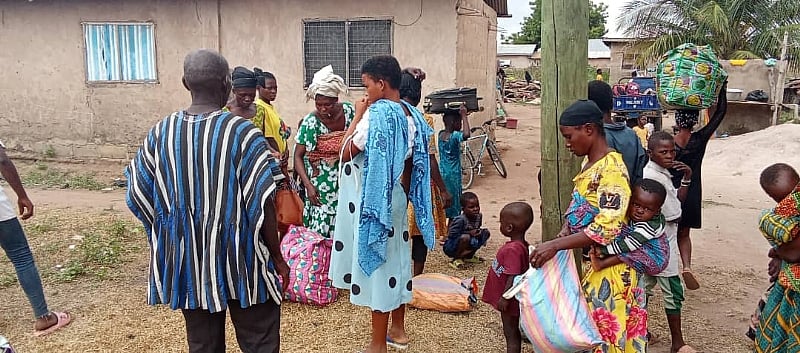The escalating ethnic clashes in the Savannah Region of Ghana have triggered a humanitarian crisis, forcing hundreds to flee their homes and seek refuge in neighboring municipalities. Wenchi, a municipality in the Bono Region, has become a sanctuary for these displaced individuals, with over 650 people arriving at Subinso Number Two seeking shelter. This influx has strained the resources of the Wenchi Municipal Assembly, prompting the Municipal Chief Executive, Miss Gloria Opoku Gyamfi, to issue an urgent appeal for humanitarian aid. The clashes, rooted in a land dispute in Gbinyiri, located within the Sawla/Tuna/Kalba District of the Savannah Region, ignited on Sunday, August 24, 2025, and have quickly spiraled into violence, claiming approximately ten lives and leaving numerous individuals injured.
The displaced population arriving in Wenchi represents a diverse cross-section of the affected communities, including women, children, the elderly, and individuals with varying degrees of vulnerability. These individuals have witnessed and experienced traumatic events, losing their homes, livelihoods, and in some tragic cases, loved ones. They arrive in Wenchi with little more than the clothes on their backs, facing immediate needs for food, water, shelter, medical attention, and psychosocial support. The sudden surge in population presents a significant challenge for the Wenchi Municipal Assembly, which is working tirelessly to provide temporary accommodation, basic amenities, and security for the displaced individuals.
The urgency of the situation necessitates a swift and coordinated humanitarian response. The Wenchi Municipal Assembly requires immediate assistance in the form of essential supplies, including food, potable water, clothing, blankets, and medical kits. Establishing temporary shelters equipped with sanitation facilities and providing access to healthcare services, including trauma-informed care and psychosocial support, are paramount. The escalating violence also necessitates robust security measures to ensure the safety and well-being of the displaced population and the host community. Collaboration between government agencies, humanitarian organizations, and civil society groups is crucial to effectively address the multifaceted needs of this unfolding crisis.
The root cause of the conflict, the land dispute, needs urgent attention to prevent further escalation and displacement. Mediation efforts involving community leaders, traditional authorities, and government representatives are essential to foster dialogue and reconciliation between the conflicting parties. Addressing underlying grievances and implementing a sustainable solution to the land dispute is critical for long-term peace and stability in the region. This includes establishing clear land ownership and usage rights, strengthening land administration systems, and promoting peaceful conflict resolution mechanisms.
Beyond the immediate needs, the ongoing influx of displaced individuals into Wenchi presents longer-term challenges that require comprehensive planning and support. The Wenchi Municipal Assembly will need assistance in integrating the displaced population into the local community, ensuring access to education and employment opportunities, and supporting the rebuilding of their lives. Sustainable solutions must be developed to address the root causes of the conflict and prevent further violence. This includes strengthening governance structures, promoting inter-communal dialogue, and creating opportunities for economic development and social inclusion.
The humanitarian crisis unfolding in the Savannah Region serves as a stark reminder of the devastating consequences of unresolved conflicts and land disputes. The displacement of hundreds of people into Wenchi highlights the urgent need for a coordinated and comprehensive response from the government, humanitarian organizations, and the international community. Addressing the immediate needs of the displaced population while simultaneously tackling the root causes of the conflict is crucial to prevent further suffering and ensure lasting peace and stability in the region. Investing in long-term development initiatives, strengthening local governance structures, and promoting peaceful conflict resolution mechanisms are essential to build resilience and prevent future displacement.


